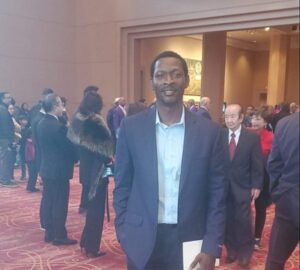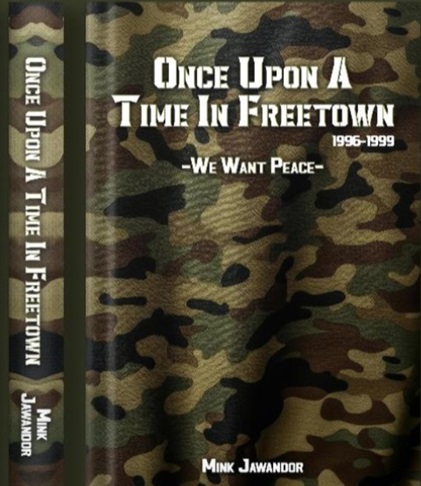The book, Once Upon a Time in Freetown (1996-1999), subtitled, “WE WANT PEACE”, and authored by Mink Jawandor will be released by the end of June on AMAZON KDP.
This project provides us with a vivid reminder, a raw and unfiltered account of the brutal civil war Sierra Leoneans fought, especially residents of Freetown, from 1996 – 1999.
It flows across fifty-five to sixty-thousand words over ten chapters dissecting elections, military coups and the tangled web of military factions in the disbanded Sierra Leone military (AFRC), the Revolutionary United Front (RUF) and local militia groups formed by local tribesmen for example the Kamajors, Tamaboroh, etc.
Once Upon a Time in Freetown is an historical work that permits Sierra Leoneans from all walks of life to reflect on our recent past because the author did not shy away from explicitly explaining the detailed horrors of the civil war in our beloved country as it openly exposes bad actors while at the same time attracts disgruntled politicians, military personnel and desperate youth from across the nation.
To give the reader a brief insight into the book, the writer explains in chronological order when the civil war officially entered Freetown (1996-1999), how residents of Freetown coped with the AFRC, RUF and the bombardment from the West African peacekeeping force, ECOMOG.
At the height of the civil crisis in Freetown, author Mink Jawandor explained in detail how all factions involved in the conflict failed to address mob justice that led to the killing of a young vibrant man by the name of Sheik Mohamed Mujtabah in the Fourah-bay community in chapter five. Mujtabah was both meaningful and useful to his community, especially to the young people in the Savage Square community.

Mink Jawandor
Once Upon a Time in Freetown also reminds us of the names that served as mouthpieces for all factions caught up in the power struggle; names like Alieu Kamara, Julius Spencer, Omrie Golley and more and how their propaganda messages brought death and destruction to the doorsteps of the residents of Freetown between 1996 and 1999 at the peak of the civil war in the country. Jawandor detailed how the voices and powerful words of such individuals were used as weapons to destroy lives and properties of the vulnerable and innocent people of the country.
Meanwhile, the senseless war was fuelled by bad governance practices, a dangerous phenomenon that the nation is once again courting due to the current political polarisation that has gripped the country.
This book is also great as research material for scholars involved in courses related to African like African Studies or Conflict Management.
The conclusions discuss how neglect by ECOWAS, displayed by how they guide political transitions and regulating the regional bloc, showing how they have led to the attraction of discontented soldiers who for example have now unleashed military coups in the Sahel of Africa. Military coups have slowly become the solution to bad politics in West Africa and other regions in Africa.
In chapter nine the book cites an example of ousted presidents like Alpha Conde, Bongo, Mohamed Bazoum and more, who were overthrown by soldiers discontented with the government behaviour.
In chapter 10 the author talked about the legacy the war left in Freetown that poorly affected and still is affecting development.
From 1996 -1999 Sierra Leone became a shell of itself due to deliberate political desperation that made Sierra Leone the most dangerous place for independent journalism during that time period.
The only known entities that came to the rescue of Sierra Leone were the European Union, World Bank and the US, as even ECOWAS was incapable of financially aiding Sierra Leone to rebuild.
That is why the author strongly believes it will be very important for these entities to step forward to aid the current conflict situation as they should not underestimate a nation like Sierra Leone, with a violent past.
Once Upon A Time in Freetown should serve as a quick reminder to entities and nations that have provided Sierra Leone with a helping hand to stand up and speak up to avert any foreseeable crises because African politicians are deliberate in their ignorance and this may take Sierra Leone back.
The author also explained how Amnesty International advised the Sierra Leone government to grant clemency to the soldiers that were arrested after the ECOMOG invention 1998, but the government refused which served partly as the recipe for the January 6, 1999 massacre.
Furthermore the author talked about some of the few fun and nostalgic times the youth of Freetown had during the standstill of the Revolution of the AFRC Junta government. The author also explained about the soccer tournament that was organised in the Fourah-bay community and other communities across Freetown, the hip hop or rap contests, the DJ competition organised by DJ Egerton Shabba and more.
Mink also delved into how Joseph Hill and the Root Reggae Band visited Freetown in the height of the crisis in December 1998, a few days before the infamous day of January 6, 1999.
Said the author: ‘I started authoring my book project more than a year ago and the perspective of my writings coming from a writer who care to bring a reminder to the people of Sierra Leone and this project has now coincide with the current outcome of the election investigations of the 2023 election that have brought Sierra Leone to a standstill, not only economically but also politically. And with our history of war we should be legitimately terrified about our nation currently and the trend of West Africa. So, therefore, it is the responsibility of ECOWAS to be steadfast in their decisions to avert another potential civil conflict.’
Author’s Biography
Mink Jawandor is a native of Freetown born to parents who were both natives of the capital city. He is currently living and getting educated in the US.
His viewpoint on the book is from the perspective of a civil witness who lived inside the war and was lucky to have survived to tell the story as an educated adult twenty-eight years later (from 1996 to 2024).
Mink holds an associate art degree, a bachelor’s in political science and a master’s in public administration with a minor in public policy.
As a credible classroom teacher of high school students, the author was compelled to write on this historic event the Sierra Leoneans in Freetown endured that emanated from poor leadership discretions, relative deprivation, greed and desperation, corruption, etc., which are also some of the internal factors or dynamics at play that most African leaders cannot control.
The author is saddened by the fact that despite what took place in Sierra Leone, nearly almost three decades after (1996-2024) these power struggles, the country and people as a whole have not moved the envelope an inch in terms of development and advancement in all sectors of society and development.
Meanwhile, as an author Mink Jawandor is influenced by Martin Meredith, who wrote The Faith of Africa in 2005 where he raised critical points aimed at discussing the socio-political and economic issues that is the bane of political instability in most African nations.
This is why he included in the telling of this story the experiences of the RUF rebels and rah-ray boys (young homeless street children) who are hopelessly lingering in Freetown waiting to self-destruct.


